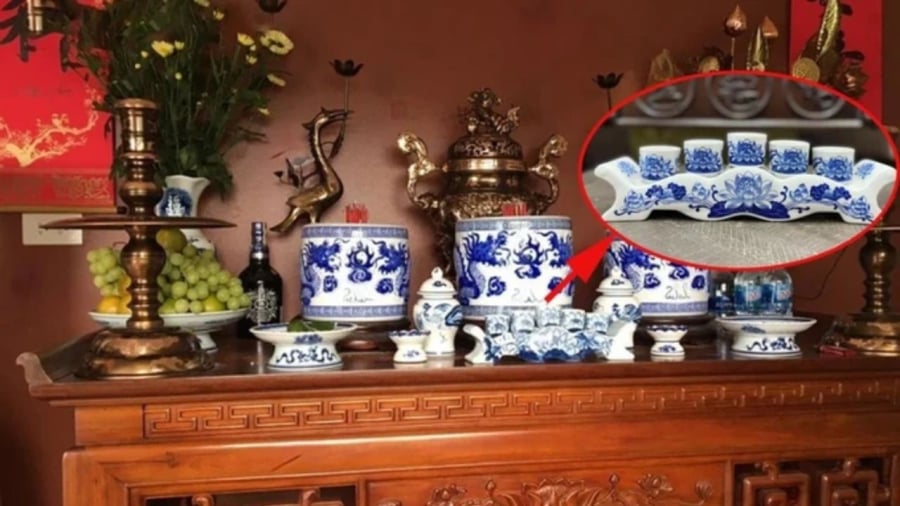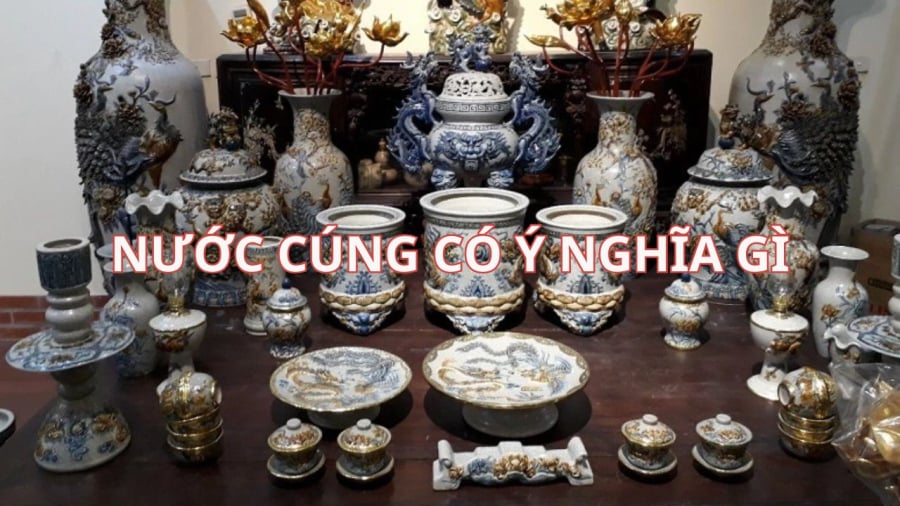In Vietnamese culture, beverages play a significant role in social interactions and etiquette. This is also evident in religious practices, where water is considered essential during rituals and offerings. Whether it’s paying homage to Buddha, ancestors, or the God of Wealth, water is a common element, often presented in a ceremonial cup or bowl.
1. What is the significance of offering water during worship?
Water has long been revered as a symbol of purity and the source of life. In spiritual contexts, it represents spiritual purity and is believed to be a conduit for positive energy and prosperity. In Feng Shui, water also symbolizes wealth and the flow of fortune, contributing to a harmonious and prosperous environment.
- In Buddhist worship, water is more than just an offering; it symbolizes the purity of the soul. It encourages followers to lead virtuous lives, free from greed, hatred, and delusion, and to cultivate a compassionate and giving spirit.
- For ancestor worship, water represents the belief that the living and the deceased coexist in parallel realms. It is believed that the water offered serves as sustenance for the departed souls.
- When worshiping the God of Wealth, water plays a pivotal role in attracting financial prosperity and maintaining positive energy for the household.

2. What type of water should be used for offerings?
A common question arises regarding the suitability of tap water, boiled water, or alternatives like alcohol, tea, coffee, or soft drinks for offerings. The choice depends on the specific altar and the deity being worshiped:
Buddhist Altar: Prioritizing Purity with Clear Water
When it comes to a Buddhist altar, the emphasis is on maintaining purity and serenity:
- Clear tap water or bottled spring water is preferred. Avoid colored or flavored water, as well as tea or soft drinks, which may distract from the intended spiritual focus.
- Boiled water that has been allowed to cool is also acceptable, as is bottled water. However, some adherents prefer tap water as it symbolizes a return to nature and purity.
- There is no need to offer multiple cups of water; one cup or three cups representing the Triple Gem (Buddha, Dharma, and Sangha) is sufficient.

Ancestral Altar: Reflecting the Living World
On ancestral altars, water symbolizes the connection between the living and the deceased:
- Clear tap water, filtered water, or boiled water are all suitable offerings.
- During special occasions or ancestral death anniversaries, families may offer the favorite beverage of the deceased, such as tea, alcohol, or soft drinks, as a way of remembrance and respect.
- Following the traditional belief that “ghosts drink tap water,” many continue the custom of offering tap water as a sign of sincerity and respect for tradition.
Wealth God Altar: Attracting Abundance and Prosperity
The Wealth God altar is a space dedicated to invoking financial blessings and smooth business endeavors:
- Typically, a set of three or five cups of clean water is placed on the altar.
- Additionally, a bowl of water with floating flowers or a glass of tap water can be included to symbolize purity and positive energy, further enhancing the attraction of good fortune.
- On special days, such as the God of Wealth’s birthday or during full moon and new moon ceremonies, some adherents may offer a cup of clear liquor or tea as a sign of respect and devotion.
3. Proper Offering of Water According to Customs and Feng Shui Principles
The number of cups of water presented on an altar typically varies between three and five, depending on the size of the altar and the beliefs of the family:
- Three cups of water symbolize sincerity and devotion to ancestors or the Triple Gem (in Buddhist altars). It also represents the three realms or three generations.
- Five cups of water represent the five elements of Feng Shui: metal, wood, water, fire, and earth, signifying harmony and completeness in the offering ceremony.
- For smaller altars, a set of three cups is acceptable to maintain a neat presentation while adhering to customs.
- Ceramic or glass cups are preferred over plastic or metal containers for water offerings.
When offering water, keep in mind the following guidelines:
- Ensure the water is clean, clear, and free from debris or strange odors.
- Replace the water daily, especially in the morning, before making any offerings or lighting incense.
- Avoid overfilling the cups to prevent spillage, which may disrupt the aesthetic and Feng Shui balance of the altar.
- Always offer the water with a sincere and respectful attitude, avoiding a casual or perfunctory approach.
While the act of offering water may seem simple, it carries profound spiritual significance. The choice of water—be it tap water for purity, filtered water for cleanliness, or tea and alcohol for remembrance—ultimately, it is the sincerity and goodwill behind the offering that matters most.
Reference for further exploration

































